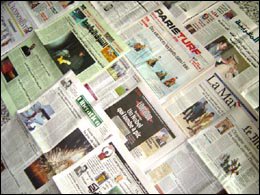According to Latifa Akherbach, Director of the Rabat-based Higher Institute of Information and Communication, Morocco's newspapers circulation rate is 13 copies per 1,000 inhabitants. This compares with an average circulation rate of 55 copies per 1,000 inhabitants in Arab countries and 285 copies per 1,000 inhabitants in France.
Speaking at a round table on the Maghreb Arab media, she noted that the circulation of newspapers in Morocco decreased from 300,000 to 250,000 in 2005, stressing that the Moroccan newspapers circulation is "weak" compared to some Maghreb countries.
Also of concern is the fact that although Arab-speaking newspapers represent 60% of the sales, they attract only of 30% of the advertisements run through the media.

All the research seems to indicate that higher newspaper readership equates with both quantitative and qualitative increases in political participation due to the resultant civic literacy. This is a plus for any state as it also creates better socioeconomic outcomes since informed individuals can better identify the effects policy options have upon their own interests and those of others in their community. In a nutshell, high civic-literacy societies are more likely to attain long-term optimal economic outcomes. However in low civic literacy societies the interests of the economically disadvantaged carry less weight since they are more often excluded from informed political participation through lack of civic competence.
Getting people to read newspapers matters.
So are there ways in which Morocco can increase newspaper readership? Naturally basic literacy is a must, but beyond that the examples set by the Nordic countries stand out. In that part of the world, reading daily newspapers remains an unquestioned part of everyday life. And this is not by accident. Efforts are made to encourage newspaper readership at all levels. For example, the daily newspaper 8 Sidor (8 Pages) is published in simple Swedish and distributed to those with low reading skills. Cassette recordings of the daily newspapers are sent out free of charge to people with dyslexia or vision impairments
If newspaper reading is associated with high social capital what about the impact of television? It is a fair question because many of my Moroccan friends who don't read newspapers claim they don't need to as they watch television. But according to American research TV viewing equates with low social capital (Putnam, 1995). Indeed, Putnam indicts increased TV viewing as the main culprit for the decline in social capital. Television, he argues, destroys social capital by taking time away from civic engagement and by making viewers less trustful of the world outside their homes.
Maybe the Moroccan government can follow the Nordic example in other areas as well. Norway, Finland and Sweden subsidize daily newspapers that are not leaders in their markets to an amount averaging around 11 percent of their income, and accounting for 3 to 4 percent of all newspaper revenues.
Whatever the answers, at least now Morocco is aware it has a problem.
In related news Al Bayane has published the figures on books published in Morocco in the period 2002 to 2004. The numbers are not good. Less than 3000 books published and many with a print run of less than 2000 copies. According to The Literary Salon weblog: Almost a third -- mainly the 'literary' stuff -- was apparently published basically at the authors' expense (i.e. vanity or essentially self-published). More than three-quarters of the books were published in Arabic, and about a fifth in French.
As a published author my heart goes out to my literary brothers and sisters in Morocco.
Tags: Morocco, Fes, Maghreb, news

2 comments:
Wonderful post - I feel for the Moroccan writers and the newspapers!
Well said.
Post a Comment